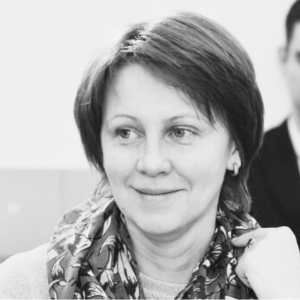On December 14, 2023, most Ukrainians celebrated. The European Council decision to open Ukraine’s membership talks was something we couldn’t have even dreamed about 10 years ago, when the standoff between peaceful protesters in downtown Kyiv and the Yanukovych government over his attempt to turn the country east was in full swing. At that time, it was only the Association Agreement with no EU membership prospects that Ukrainians could hope for. Russian aggression has changed that. Today, Ukraine’s integration into the EU and other western institutions is not only about the wish of the Ukrainian people to be a part of the European family where Ukraine rightfully belongs. It is also about the new security architecture on the continent.
Yuliya Kazdobina for Baltic Rim Economies
The Russian war has taught us many important though unwelcome lessons. I would like to highlight just three of them.
- 1. The values and principles that have kept Europe and the western countries at peace after hundreds of years of constant wars are not shared by everyone. Russia sees itself as a separate civilization and explicitly rejects respect for human rights, international law, state borders and other countries’ sovereignty as alien to it. “Russian borders do not end anywhere”, President Putin claims. This renders the vision of “Europe Whole, Free and at Peace” with Russia as a part of it impossible. At least, not before Russia is genuinely changed.
- 2. Negotiations aimed at finding a middle-of-the-road solution with a deliberate and capable aggressor do not lead to peace. Ukraine had spent 8 years trying to settle the conflict caused by Russian hybrid aggression in the Donbas. The process involved more than 200 negotiation rounds and 20 ceasefire agreements and still ended with the war. Even more. Western leaders including US President Biden, French President Macron, German Chancellor Merkel had many phone calls and meetings with the Russian President attempting to assuage his alleged security concerns as he was getting ready for the full-scale invasion. These efforts lead only to accusations and escalating demands, the last of them being the retreat of NATO to the 1997 borders. We are learning the hard way that Russia perceives the willingness to compromise as weakness and this only stimulates its appetites.
- 3. Russia’s perceived exercise of restraint construed by some in the west as an intention to avoid further escalation is, in fact, Russia preserving its escalation options for future use. Russia saves the options to apply them at a more opportune moment. This was the case during the Minsk negotiations when Russia stepped up its military pressure to extract concessions from Ukraine when it saw fit. This was the case with the full-scale aggression launched at the time of a comedian becoming President of Ukraine and changes in the leadership of some key western countries. This was the case with the Black Sea Grain Initiative, when Russia withdrew from the Grain Deal and launched a series of attacks on the Ukrainian port and grain storage facilities on the eve of the new harvest. In addition, Russia is showing no desire to stop and is clearly gearing up for another round of aggression.
In addition to the lessons above, there is an uncertainty about the role the US is going to play in European security with Donald Trump posed to become the next US President. His attitudes and statements during his first term and in recent months provide many reasons for concern. Although the Congress made a law that will prevent any U.S. president from unilaterally withdrawing from the Alliance, Article 5 doesn’t call for an automatic response. In addition, the use of force by the US must be authorized by both, the President and the Congress. Nobody knows what Trump’s decision is going to be.
Although it’s tempting to frame the war in Ukraine as a “Ukrainian crisis” and concentrate on resolving it, one needs to watch Russian actions closely. Russian antiwestern and antidemocratic rhetoric as well as continued below-the-threshold aggression against Europe indicate that Ukraine is not the only target. Russia has moved its tactical nuclear weapons to Belarus. There are reports that it’s setting conditions for an attack on the Baltics. In a recent EW testing incident, it left half of the Polish territory without GPS coverage. Although it’s hard to imagine Europe being kinetically attacked, one needs to remember that Russia had taken 8 years to build up its military presence in Crimea before launching its full-scale attack on Ukraine. And it managed to do so while everybody concentrated on the Donbas and the Minsk “peace process”.
There are no perfect historical parallels, but we now appear to be in the early days of the Cold War, when the west wanted to live in peace with the Soviet Russia, but the Soviet Russia was not interested. Just like then, Russia asserts its exceptionalism and uses force to subjugate its neighbors and deprive them of either their agency or the right to exist. Just like then, it continues to threaten western countries. The major difference is, though, that the US is not as strong a player while the European Union is. This leaves it first and foremost up to us Europeans to decide what happens on the continent.
Both Ukraine and the EU have decided that Ukraine should become a part of the Union. Ukraine is making bilateral security agreements with several European states. It’s also posed to become a NATO member. This means the line is gradually being drawn, although, I am sure, nobody in the west wants to go back to the Cold War tensions. Russia, however, did not ask. It’s Russia’s actions that make a new version of the old security arrangements necessary and leave no space for peace and dialogue. To stop the war and live in relative prosperity and peace we Europeans need to join forces and give the aggressor a concerted answer.



